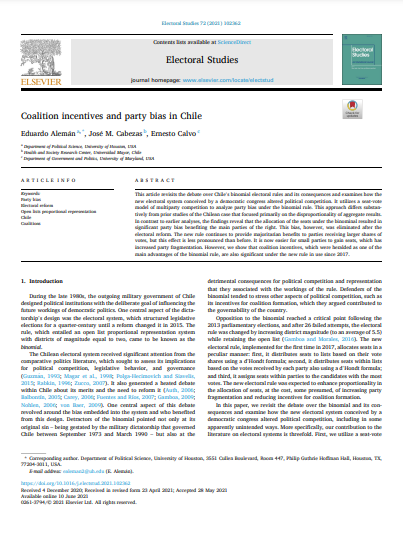Coalition incentives and party bias in Chile

Fecha
2021-08-01Autor
Aleman, Eduardo
Calvo, Ernesto
Cabezas, Jose M. [Univ Mayor, Hlth & Soc Res Ctr, Chile]
Ubicación geográfica
Notas
HERRAMIENTAS
Acceda a títulos restringidos
¿Cómo descargar?Resumen
This article revisits the debate over Chile's binomial electoral rules and its consequences and examines how the new electoral system conceived by a democratic congress altered political competition. It utilizes a seat-vote model of multiparty competition to analyze party bias under the binomial rule. This approach differs substantively from prior studies of the Chilean case that focused primarily on the disproportionality of aggregate results. In contrast to earlier analyses, the findings reveal that the allocation of the seats under the binominal resulted in significant party bias benefiting the main parties of the right. This bias, however, was eliminated after the electoral reform. The new rule continues to provide majoritarian benefits to parties receiving larger shares of votes, but this effect is less pronounced than before. It is now easier for small parties to gain seats, which has increased party fragmentation. However, we show that coalition incentives, which were heralded as one of the main advantages of the binomial rule, are also significant under the new rule in use since 2017.
URI
https://repositorio.umayor.cl/xmlui/handle/sibum/9054https://www-sciencedirect-com.bibliotecadigital.umayor.cl:2443/science/article/pii/S0261379421000810?via%3Dihub
https://doi-org.bibliotecadigital.umayor.cl:2443/10.1016/j.electstud.2021.102362
Coleccion/es a la/s que pertenece:
Si usted es autor(a) de este documento y NO desea que su publicación tenga acceso público en este repositorio, por favor complete el formulario aquí.